What is Lab-grown leather?
- Genuine.
- Cruelty-free→Animal-friendly.
- Environmentally friendly.
- Unique benefits with unique features.
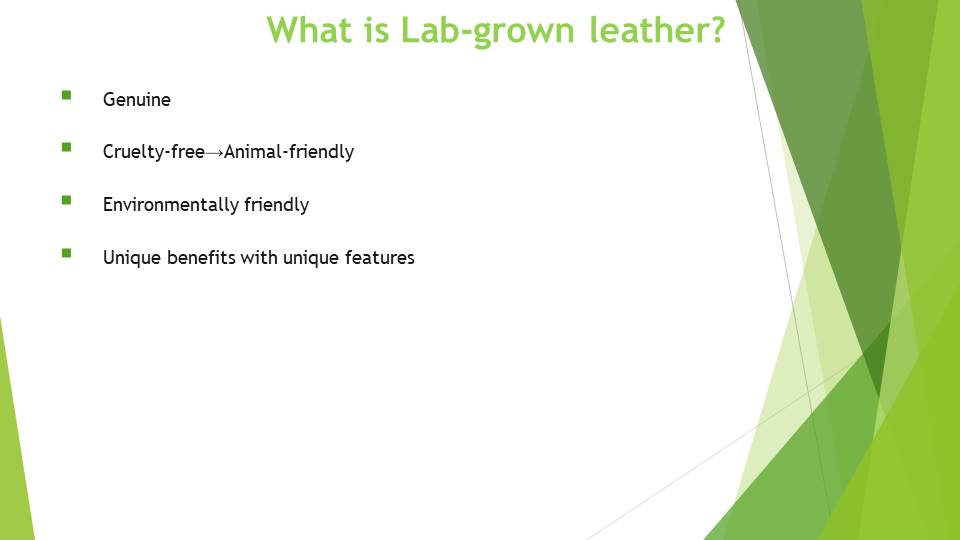
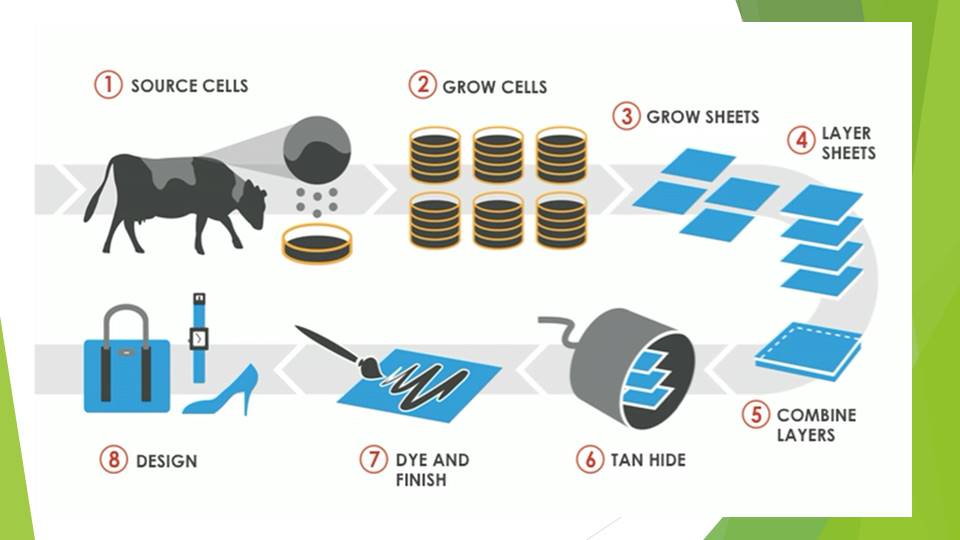
The Promotion
- Audience Analysis.
- Resellers and Distributors.
- Promotions.
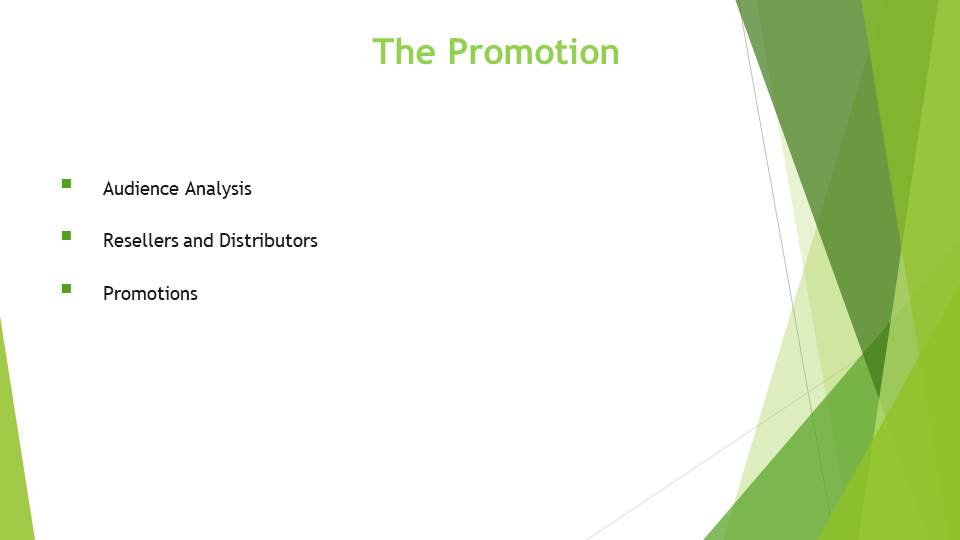
The Audience: BTOB
- High-end luxury brands:
- Stella McCartney, Matt & Nat, Ralph Lauren, etc.
- Already established multi-brand companies:
- Modavanti.
- LVMH.
- Vaute Couture.
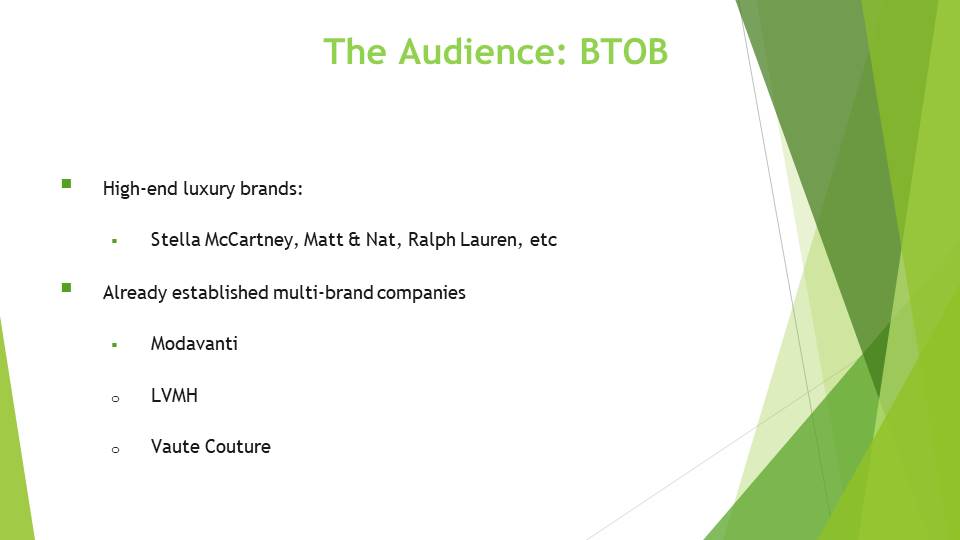
The Audience: BTOC
- The luxury consumers:
- The number of luxury consumers has more than tripled in under 20 years. (About 330 million people).
- Spending has risen to an estimated $300 billion in 2013.
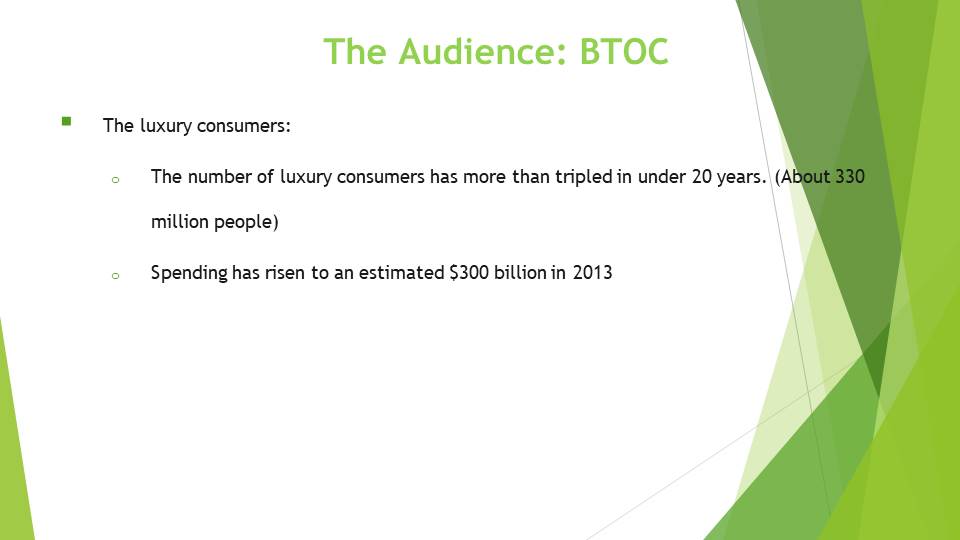
The Luxury Consumer
- The Connoisseur.
- The Status Seeker.
- The Creative.
- The Altruist.
- The Splurger.
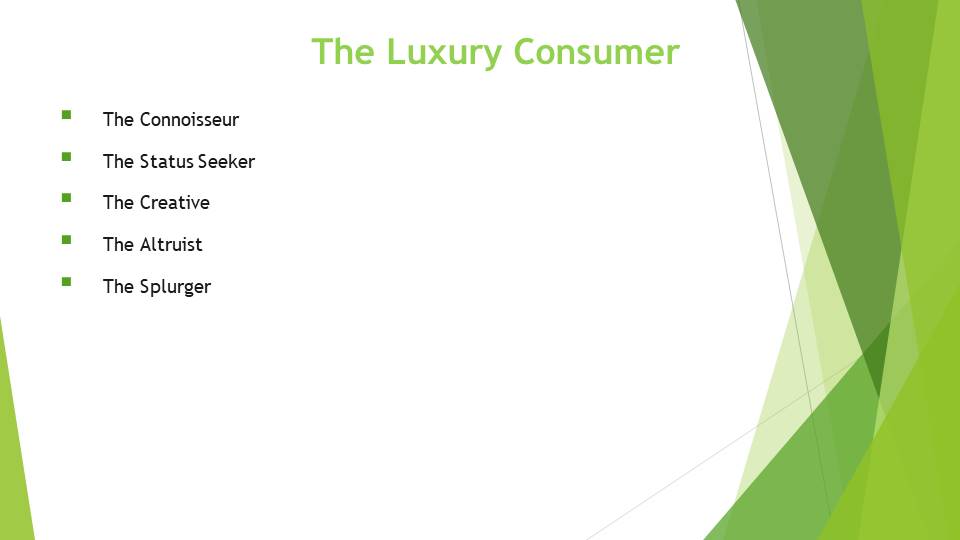
Modern Meadow: What is it?
- A technology to 3D-bioprint meat & leather:
- start with a puncture biopsy of an animal – the basic unit, the cell.
It can have all the characteristics of leather because it is made of the same cells.
Cultured leather will be available to be used in fashion accessories and apparel. Modern Meadow is in discussions with designers to prepare a prototype item made from our materials.
- Advanced, high performance properties:
- Softness.
- Durability.
- Breathability.
- Color-fastness.
- Elasticity.
- Pattern.
- Less waste and toxicity in tanning and manufacturing process.
- No hair to remove, no scars or insect bites, and no waste.
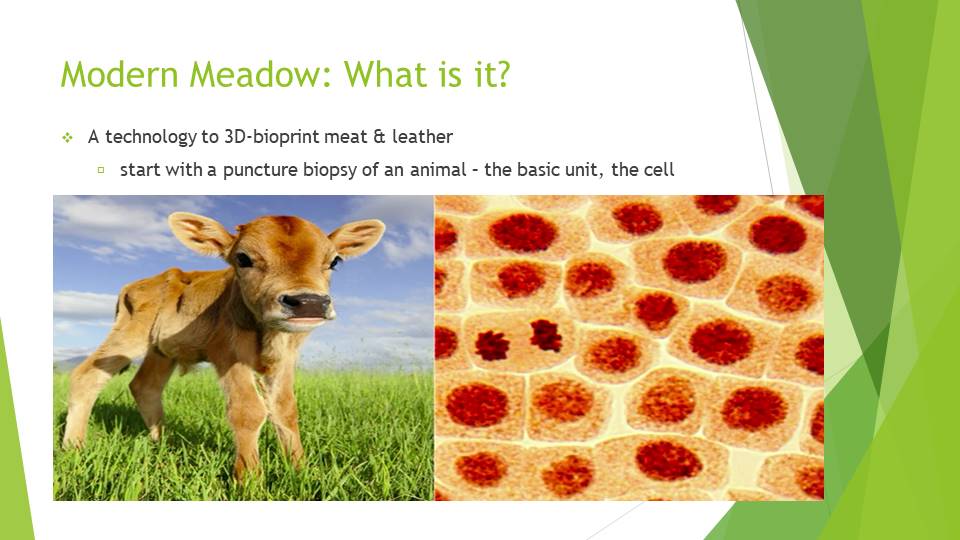
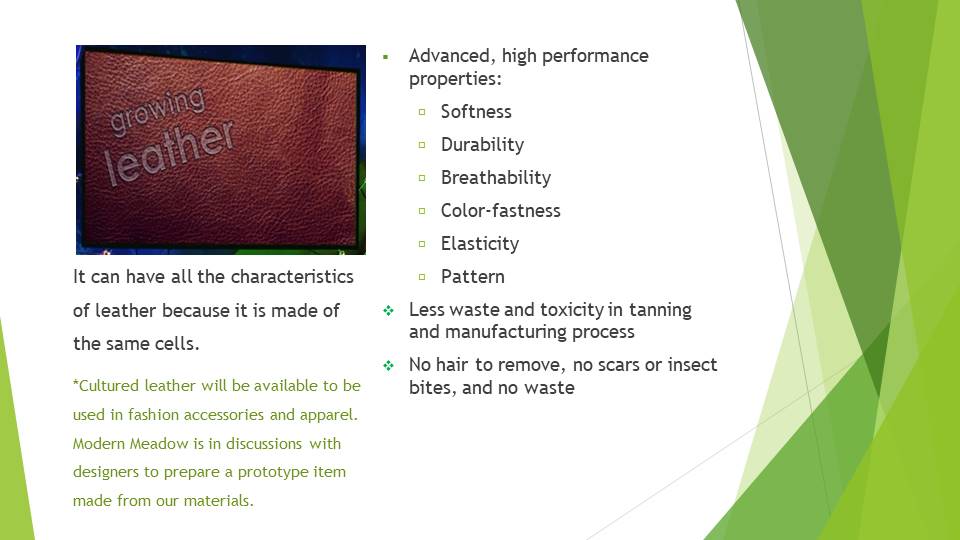
Our livestock
- One of the largest users of land, fresh water, and one of the biggest producers of greenhouse gases.
- So many animals so close together: a breeding ground for disease and opportunities for harm and abuse.
- Affects the environment, public health, and food security.
By 2050, it will take 100 billion land animals to provide the world’s population with meat, dairy, eggs and leather goods.
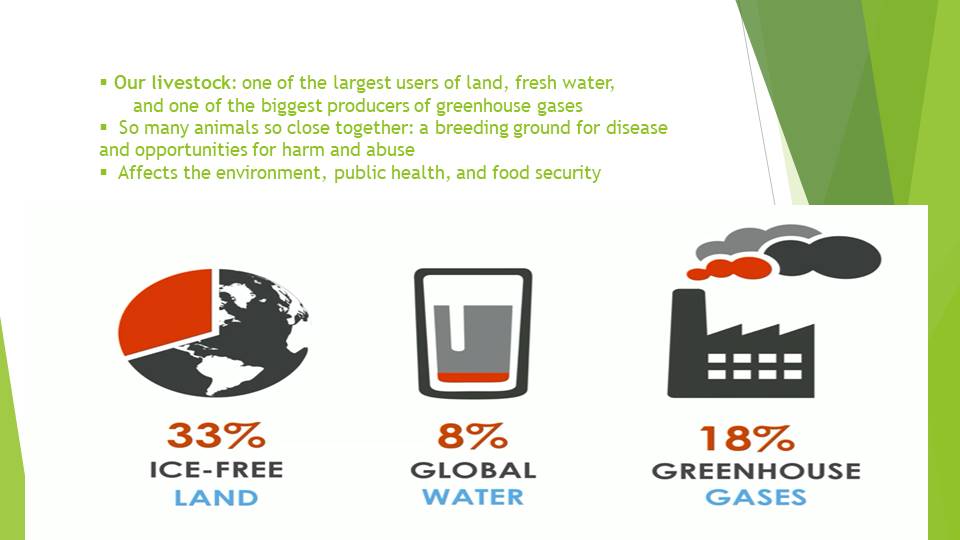
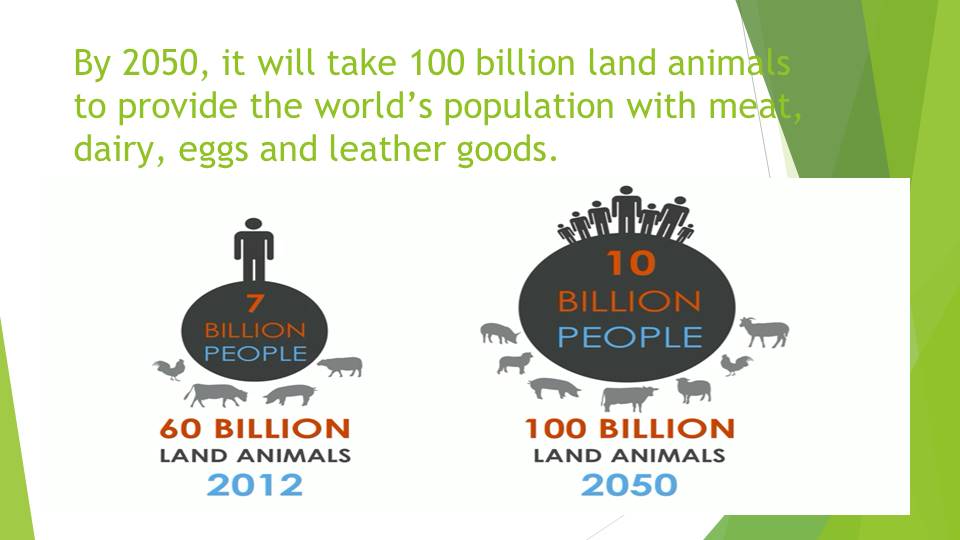
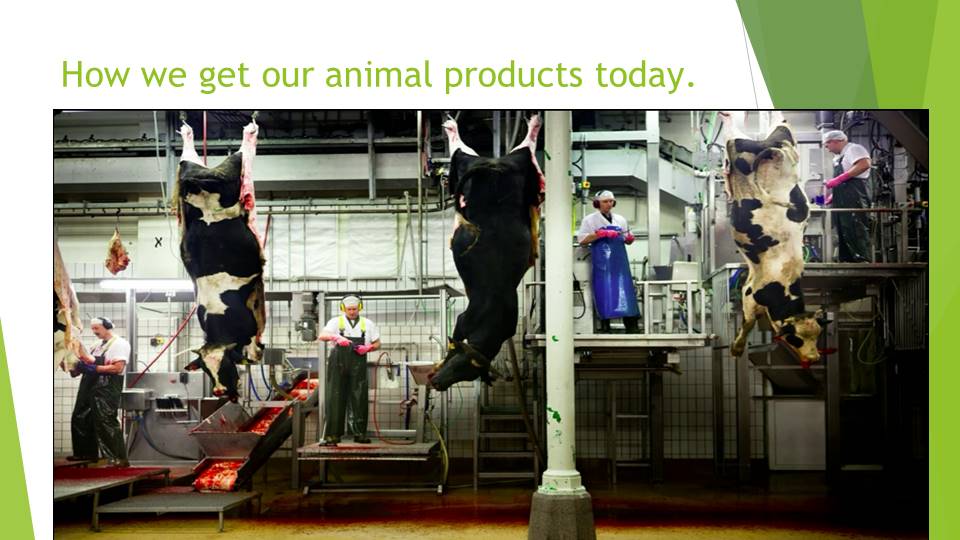
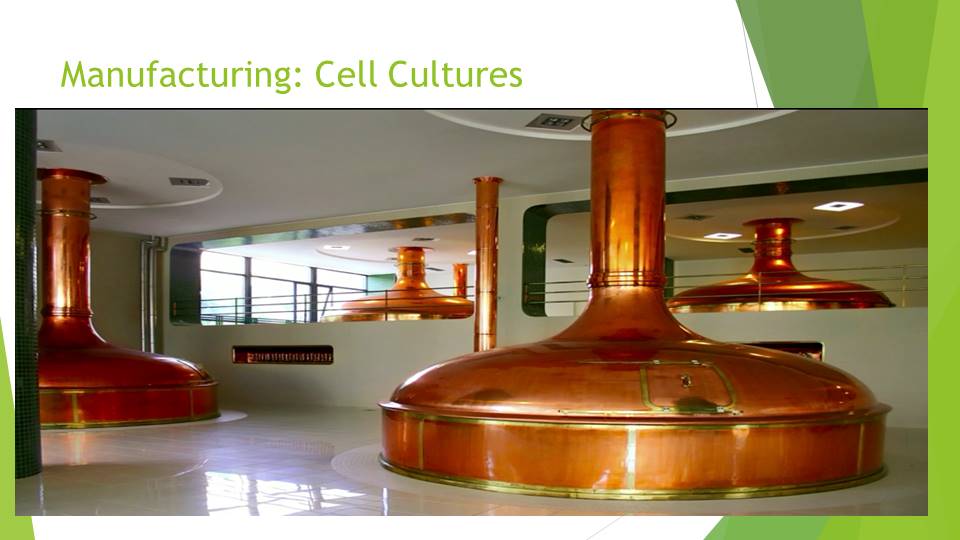
Targeting & Segmenting the Market
- The company’s goal is to redirect its efforts of tissue engineering to target consumers:
- Luxury Brands.
- Leather Goods.
- Animal-lovers.
- Tissue engineering Industry is fairly large with a specific target market:
- Modern Meadow’s segmented market that extends to fashion businesses such as highest end luxury leather and good companies gives the company a competitive advantage.
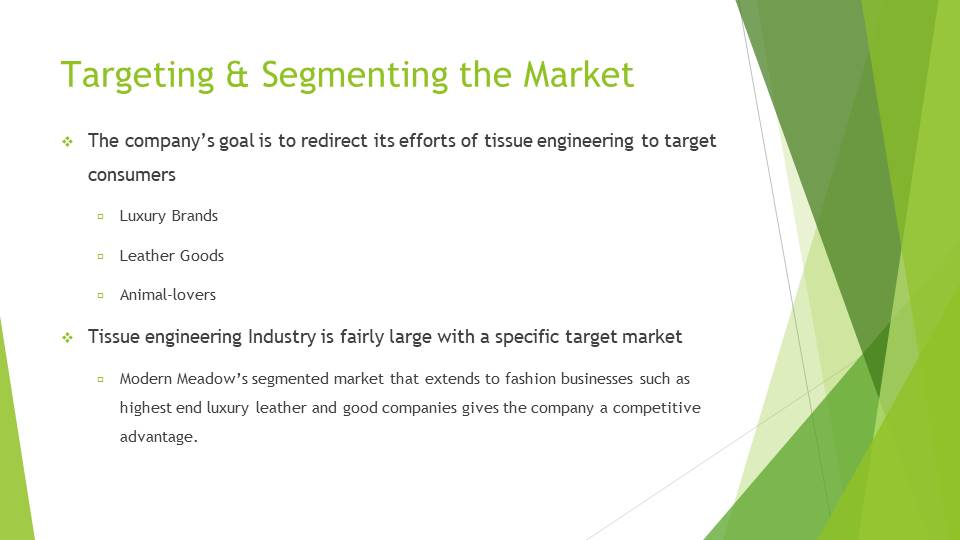
Green Movement in Fashion
- Sustainable Fashion.
- Natural and organic fabrics:
- (e.g.) buying from artisans, utilizing hemp into their lines.
- Cruelty-Free companies.
- Eco-Friendly Luxury Brands:
- (e.g.) Stella McCartney, Manolo Blahnik, Bodkin, Honest, Suno, Marni, Maiyet.
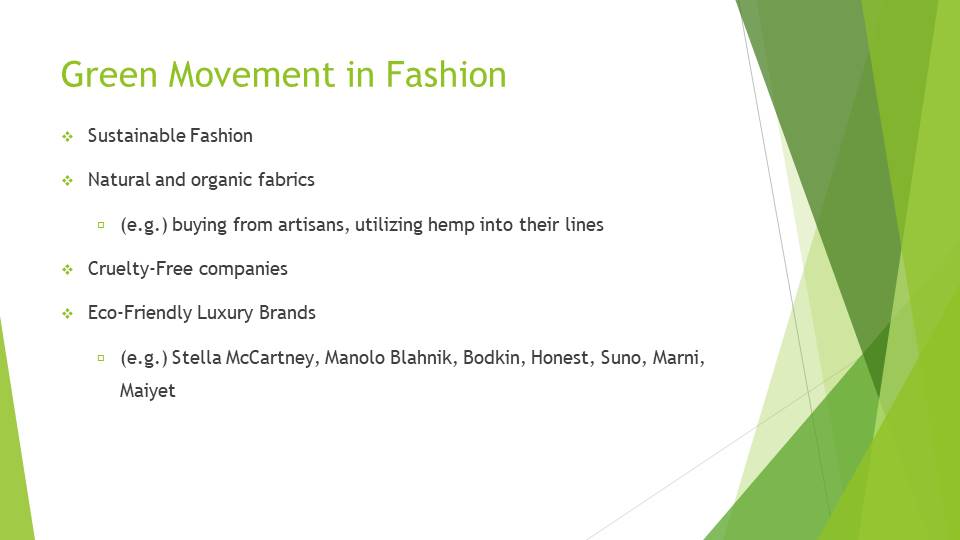
Part One: Advertisement to End User
Theoretical Model
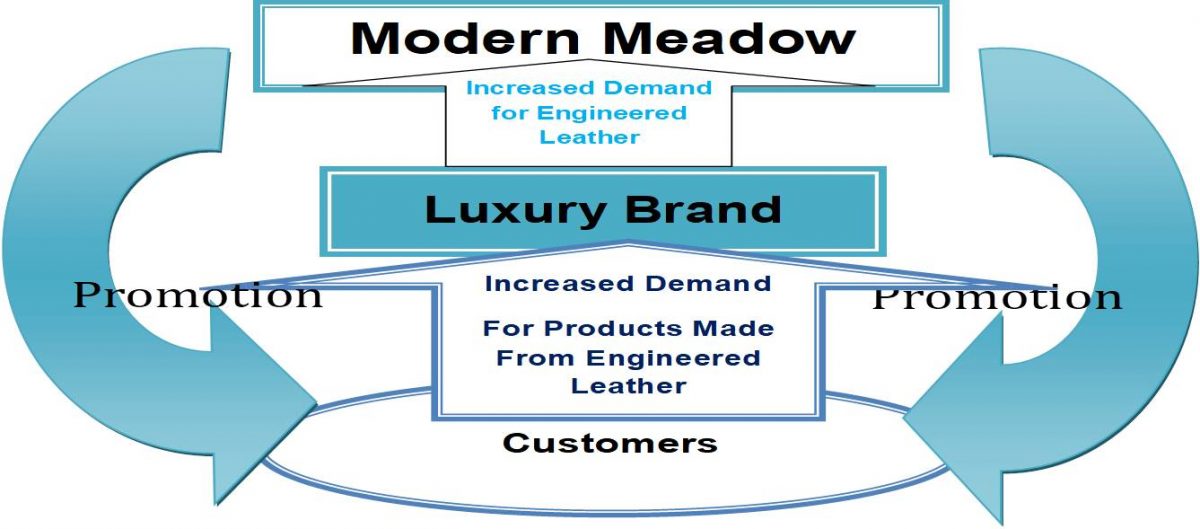
The theoretical model depicts that Modern Meadow should target end users in promoting engineered leather. According to Pride, marketers should target end users of products because they have immense power to influence consumer behavior (68). Since customers are unaware of the existence of engineered leather and the need to use alternative sources of leather, promotion would increase the awareness, and consequently, convince and persuade them to buy products made from engineered leather as opposed to those of natural leather. Thus, increased demand for products made from engineered leather would compel leather industries (Luxury Brand) to use engineered leather. Since Modern Meadow produces engineered leather, it would be the one supplying engineered leather to Luxury Brand to meet the rising demand among end users.
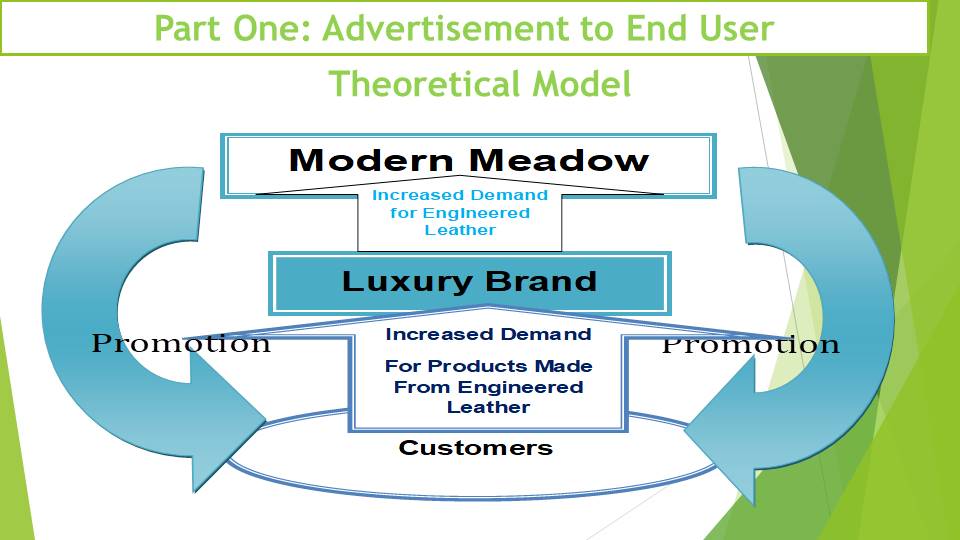
End Users or Target Customers
- Modern Meadow Inc manufactures engineered Leather.
- Consumers of engineered leather include luxury brand and users of leather products.
Since Modern Meadow Inc is a company that manufactures engineered leather that does not entail killing of animals, a significant number of its consumers will comprise of leather companies and users of leather products. Durkin states that consumers of leather products are diverse in terms of demography and purchasing behaviors (par. 6). When consumers purchase leather products made from engineered leather, companies that use leather to manufacture their products such as luxury bags, shoes, clothing, and accessories would purchase the products of Modern Meadow Inc Company. Evidently, the end users of engineered leather are individuals, who value animal lives and like using leather products.
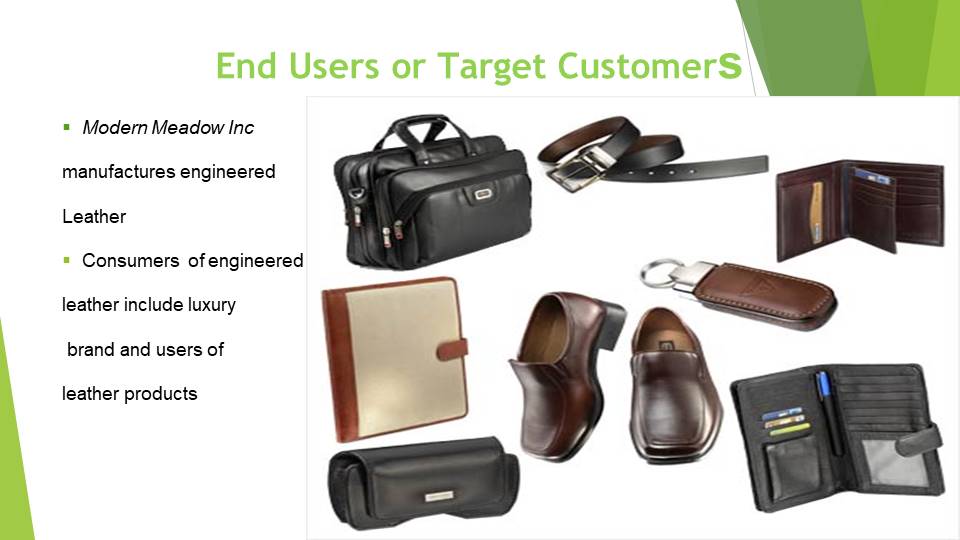
Leather Market
Global market of leather indicates that Brazil, the United States, and China require a million tones of leather yearly (Food and Agricultural Organization 8). From these figures, it is evident that the leather market spreads across the world. According to Pasolini, 70 billion animals die every year and produce leather that various companies use in making leather products.
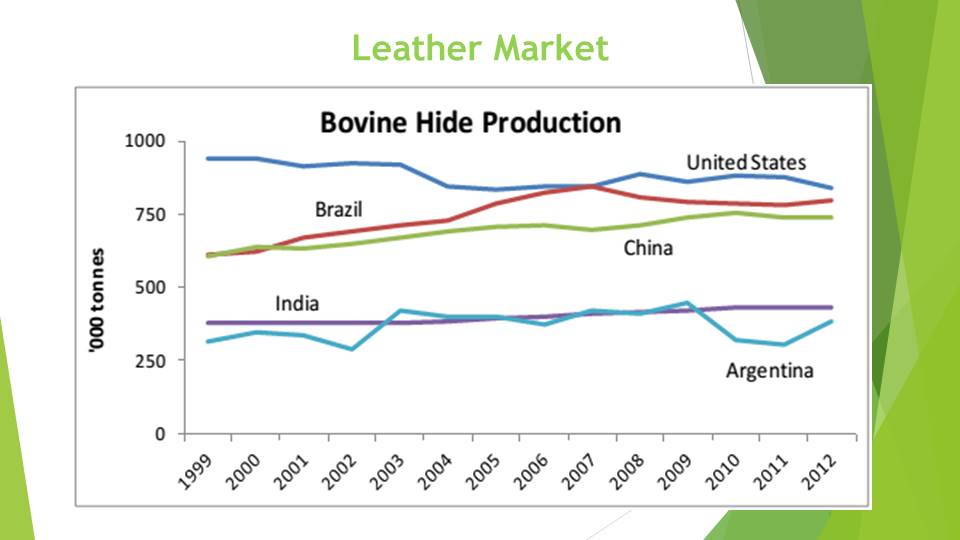
Product Promotion
- Target individuals, who consume leather products from engineering leather, but not from animals.
- Promote engineered leather.
The target customers of Modern Meadow Inc incorporate consumers of leather products, but do not like the treatment that innocent animals experience before extracting hides from their bodies. Therefore, the company should tailor its promotion strategy towards the significance of using leather that does not originate from the death of animals, but from the laboratory. It is imperative to understand that an effective advertisement persuades target consumers, who love leather products purchase them (Fountain par. 5). Remarkably, a good promotion and advertisement strategy not only increases the level of consumer awareness, but also boosts the company’s sales volumes.
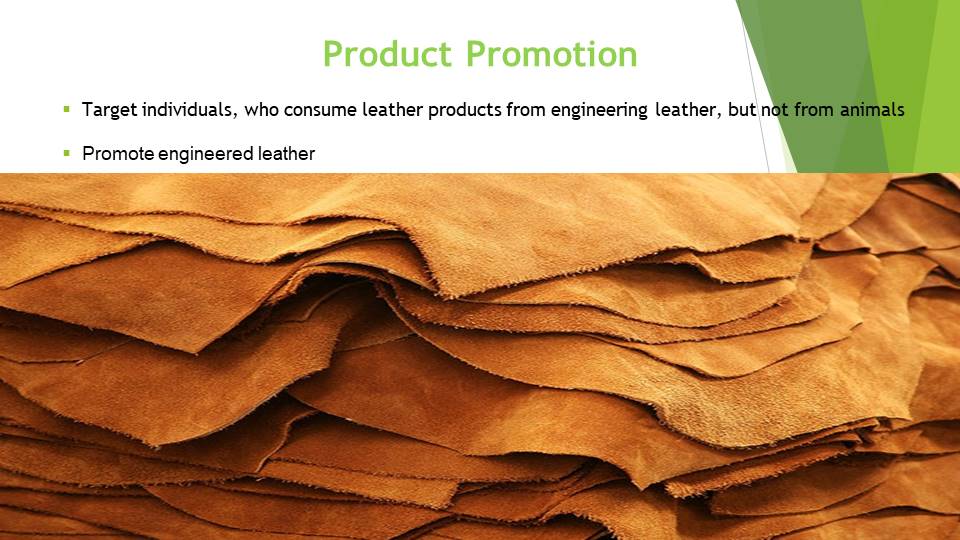
Market Share
- The market share comprises consumers of alternative leather products.
- Louis Vuitton, Hermes, and Chanel comprise Luxury Brand companies.
The market share of Modern Meadow Inc comprises of consumers of leather products from alternative sources as opposed to the common source, which is animal by products. People for the Ethical Treatment of Animals explain that a considerable share of consumers purchase leather products from companies that use animal skin (par. 9). Companies such as Louis Vuitton, Hermes, and Chanel, which use leather, are dominant players in the leather industry. By 2050, the global demand for animal products and the demand will double, the current demand occasions slaughter of 70 billion animals, and so, Modern Meadow Inc can tap the demand to its advantage (Pasolini par. 9). Therefore, it is clear that there is a current demand of about 70 billion animals, a phenomenon that Modern Meadow Inc can capitalize on to dictate its market share.
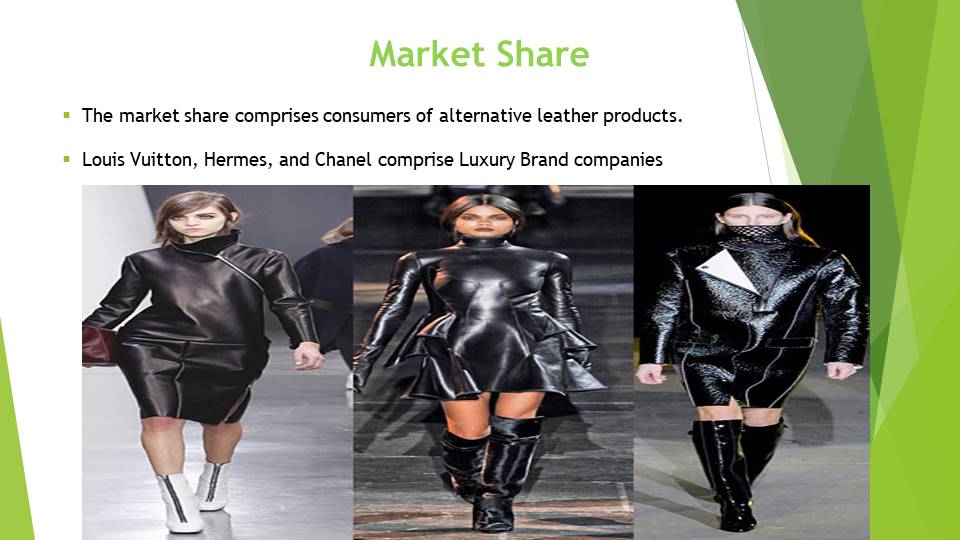
Target Consumers
Use creative and effective promotional strategies such as magazines, the Internet, television, and conferences.
Modern Meadow Inc can increase the level of awareness among its consumers through an effective promotion and marketing strategy. The strategy must entail a creative passage of information to the target consumers and manufacturers of leather products like luxury handbags using creative and effective promotional strategies such as magazines, the Internet, television, and conferences. Pride explains that the content used in promotion of products should not only increase the knowledge that customers possess about the product, but also persuade them to use the product (26). The focus of the customer awareness is enlightenment of consumers on the significance of using engineered leather on the environment, animal lives, as well as its quality.
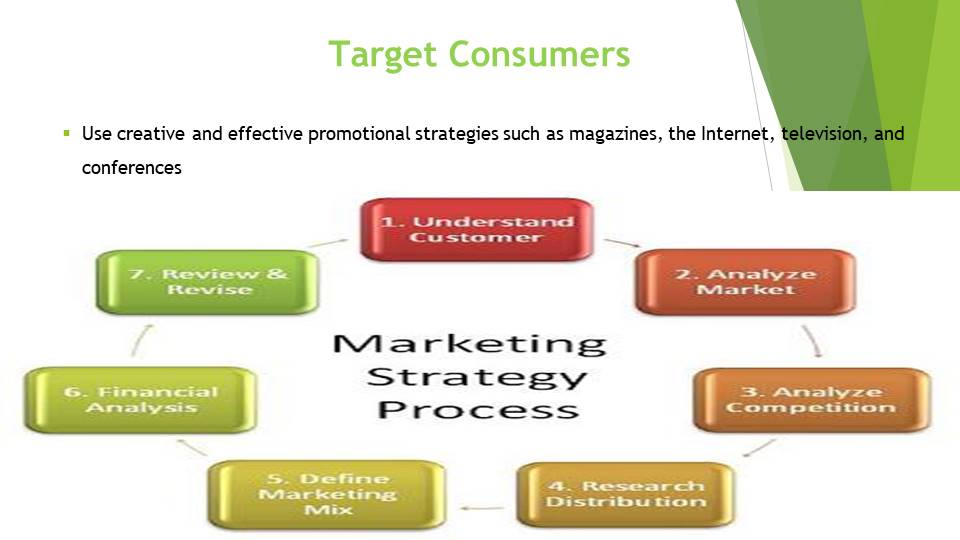
Part Two: Leather is Not a By-product
Misconceptions
- Most people believe that leather is by-product of meat industry.
- The belief creates misconceptions among leather manufactures and consumers.
- However, leather is a co-product of meat.
A significant number of people in the world believe that leather is a by-product of the meat industry. These people believe that the demand for meat leads to production leather that comes as a by-product of meat. The misconception that leather is a by-product of meat influence how industries promote leather products among consumers. As a result, animals continue to suffer and die through inhumane acts (People for the Ethical Treatment of Animals par. 6). The misconception supports that killing animals is necessary to obtain leather.
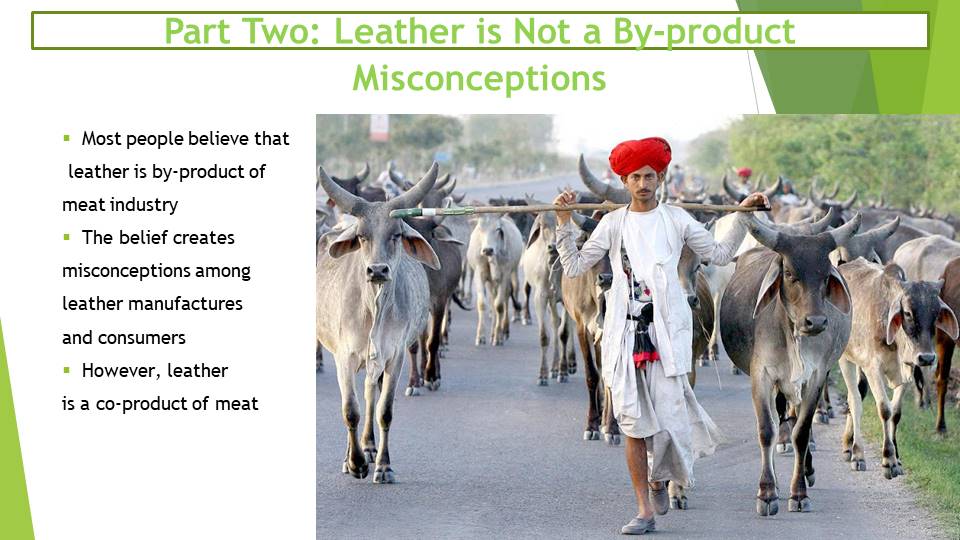
Cows Killed Mainly for Leather
70 billion animals die every year because of the unending demand for meat and leather.
Leather generates over 50% profits in slaughterhouses.
Currently, 70 billion animals die every year because of the unending demand for meat and leather (Pasolini par. 10). Although individuals believe that meat is the main factor that causes slaughter of animals, the demand for leather has exceeded the demand for meat. According to Keegan, leather generates over 50% of profits in slaughterhouses (par. 2). Notably, leather brings in more revenues than meat, and thus, people slaughter hundreds of animals daily to meet the demand for leather. Pasolini asserts that absence of alternative sources of leather or meat leads to increased suffering and killing of animals (par. 10). The rising demand for leather products has increased cruelty against animals.
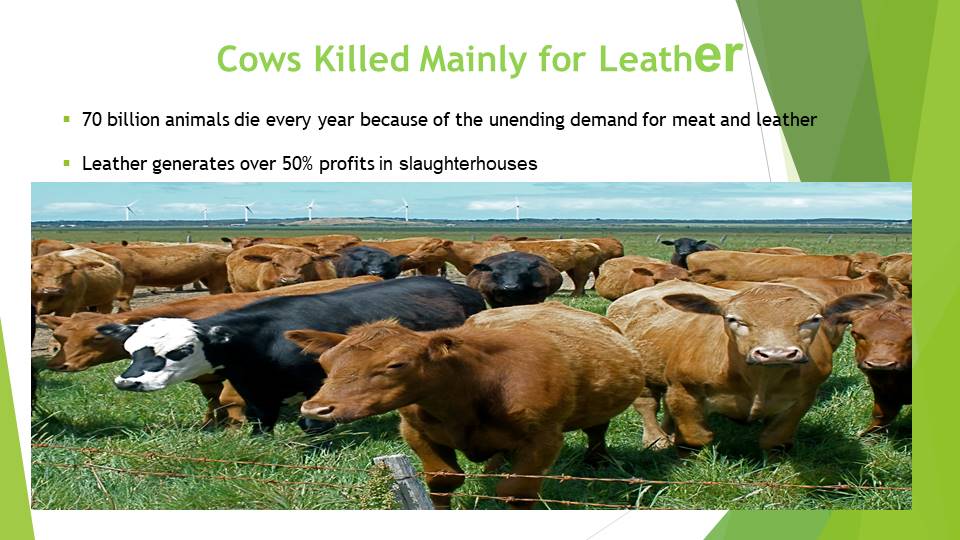
Natural Leather
The rising demand increases the deaths of animals, and cause 20-50% cancers among workers.
Livestock release 20% of greenhouse gases.
The use of leather is significant and its products are in high demand in the market. Since the main raw materials for leather are animal skins, the manufacturers of leather kill animals so that they can extract the product from them (Tazi par. 7). The rising demand for leather and its products has occasioned a sharp increase in the number of animals that suffer and die as manufacturers of leather strive to meet the demand. Additionally, since leather-tannery uses chemicals, they cause about 20-50% of cancer among workers (People for the Ethical Treatment of Animals par. 6). Keeping of livestock contributes to 20% of greenhouse gases (Pasolini par. 9).
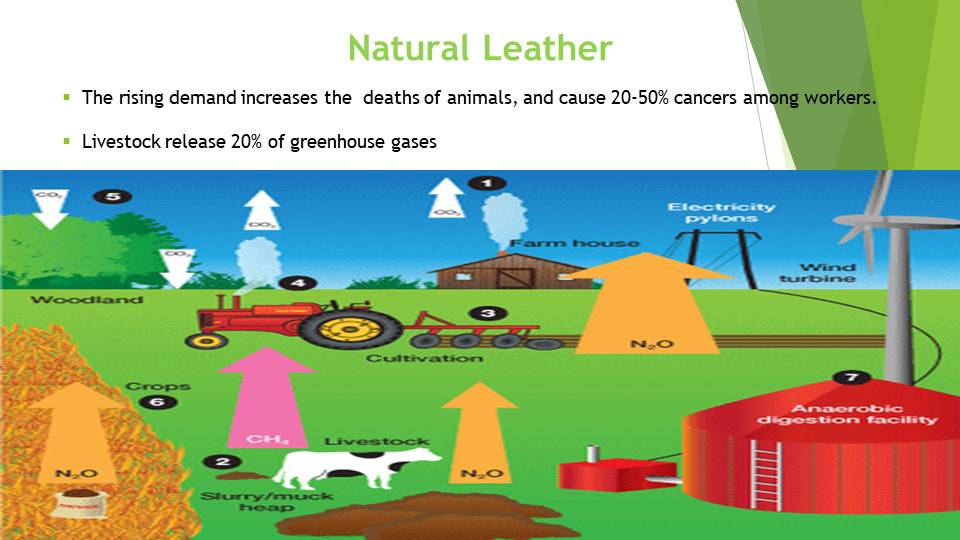
Engineered Leather
Engineered leather by culturing fibroblasts in laboratory.
Modern Meadow Inc seeks to produce engineered leather by culturing fibroblasts in the laboratory (Fountain par. 10). Engineered leather is quality leather that is not a co-product of meat. Fibroblasts grow as cells in the laboratory and mature into a tissue that forms the source of leather. Pasolini highlights that people kill a considerable number of animals, mainly for purposes of leather as opposed to meat (par. 7). A combination of the demand for meat and leather further compounds the seriousness of the suffering that animals experience as manufacturers and suppliers attempt to provide meat and leather. Therefore, since Modern Meadow Inc provides an alternative source of leather and meat, the slaughter of animals will reduce. The reduction of the suffering that animals experience materializes when consumers appreciate and purchase products manufactured from engineered leather.
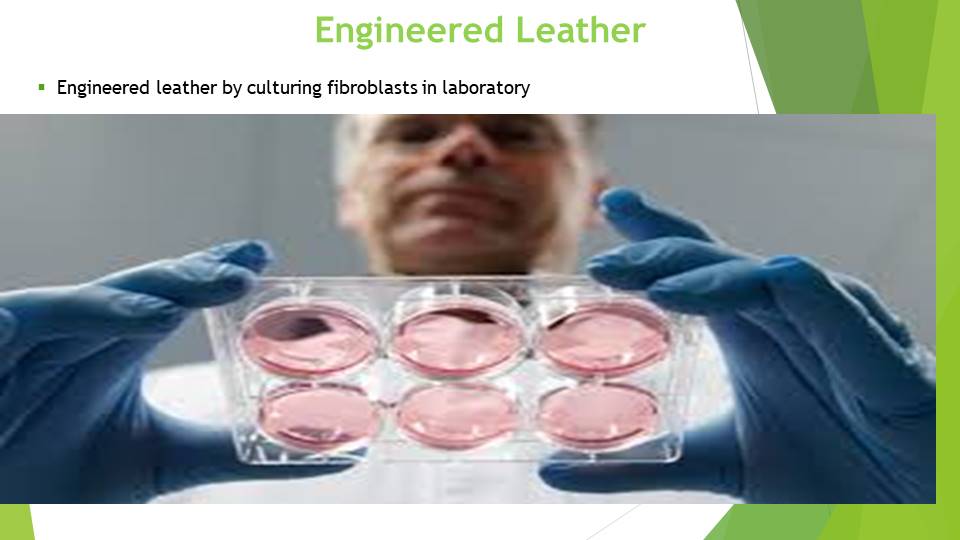
Unsustainable Demand for Leather
- The demand for natural leather is unsustainable.
- Currently, the world needs about 60 billion animals for leather.
- Engineered leather offers sustainable and non-cruel leather.
Projections show that the extraction of leather from animals is unsustainable. According to the presentation by Forgacs, the increasing demand due to population increase requires 100 billion animals by 2050, which currently stands at about 60 billion (Forgacs). This means that Modern Meadow is timely in providing engineered leather, which is not only sustainable but also eliminates cruelty against animals.
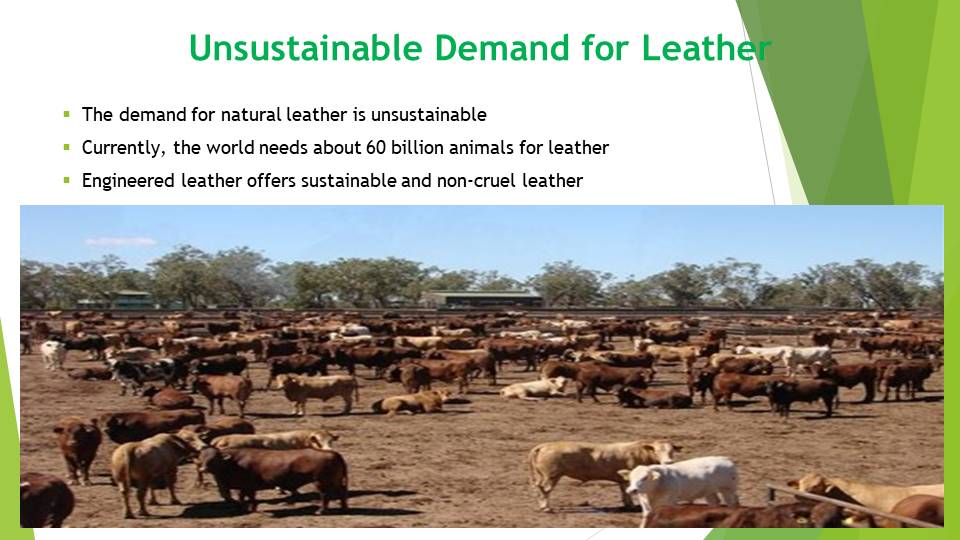
Modern Meadow
- Modern Meadow Inc aims to produce engineered leather.
- Employs biotechnology in production of quality leather.
- Modern Meadow Inc should brand its products in the market.
- Quality, variety, and prices should be key considerations.
The main product offered by Modern Meadow Inc is engineered leather. To promote engineered leather, the company should give a unique brand in the market. The quality and variety of the products increase the appeal of luxury handbags, shoes, clothing, leather belts, and other fashionable products. Prides explains that low priced products facilitate effective market penetration especially for new companies (32). Notably, low priced products facilitate effective market penetration especially for new companies.
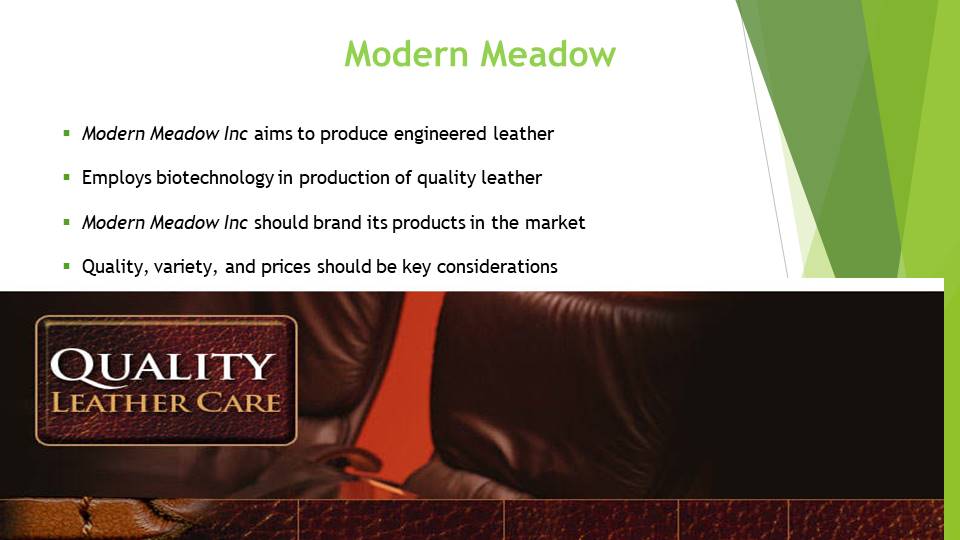
Works Cited
Durkin, Erin. Biotech startup specializing in faux leather, beef looks to open in Brooklyn. 2014. Web.
Food and Agricultural Organization. World Statistical Compendium for raw hides and skins, leather and leather footwear 1993-2012. 2013. Web.
Forgacs, Andras. Leather and Meat without killing animals. 2013. Web.
Fountain, Henry. Building a $325,000 Burger. 2013.
Keegan, Kay. The Truth About Leather: Wearing Cruelty. 2010. Web.
Pasolini, Antonio. Modern Meadow plans on producing lab-grown leather. 2014. Web.
People for the Ethical Treatment of Animals. Leather: Animals Abused And Killed for Their Skins. 2014.Web.
Pride, William. Marketing. New York: Cencage Learning, 2004. Print
Tazi, Philips. Laboratory leather reality. 2012. Web.